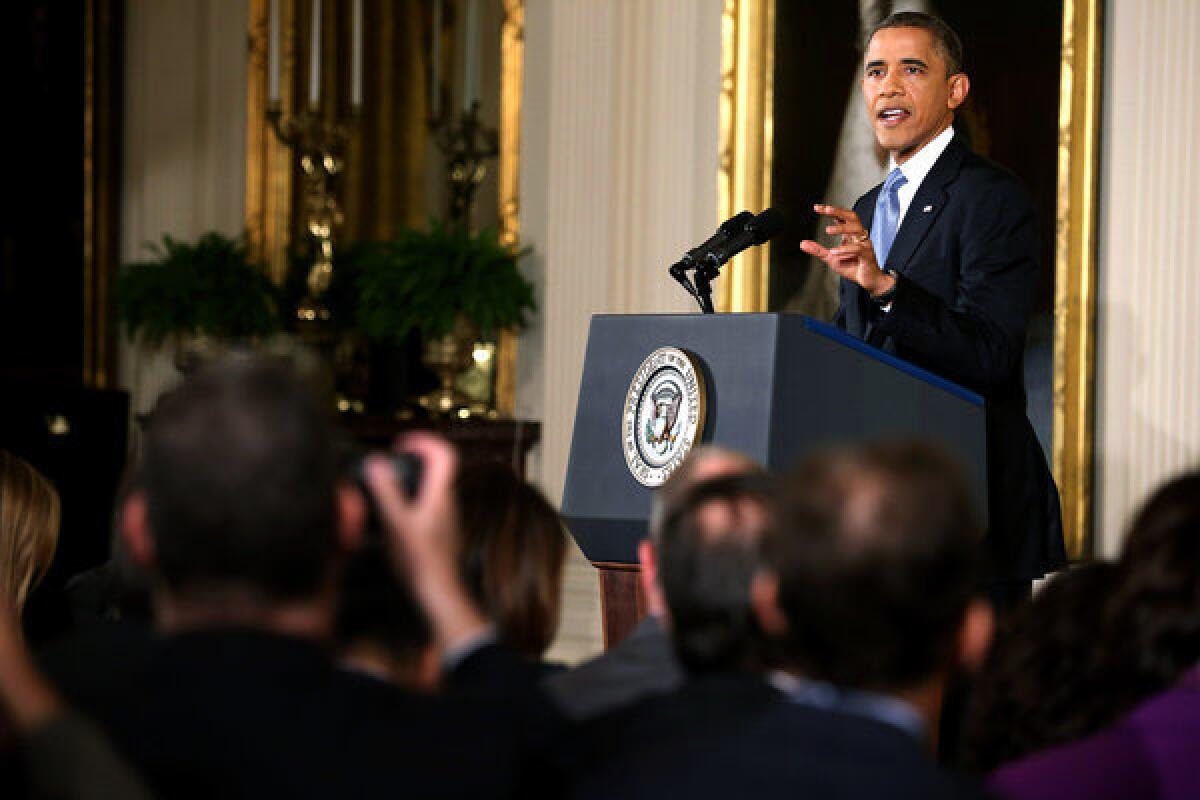President Obama talking relentlessly about the middle class

- Share via
In his first press conference since his reelection, President Obama found himself in a position few would have predicted even a few months ago.
The incumbent was on message and on his most comfortable footing Tuesday talking to the media about the economy — demanding tax increases for the wealthiest Americans and repeatedly invoking his concern for the middle class.
When his inquisitors put foreign affairs and national security on the table, the president mostly spoke with a lot less force. Unfurling events in the investigation of former CIA Director David Petraeus and of the deaths of four Americans in Libya have put the president on the defensive on foreign policy, considered his safest haven during his long run for a second term.
Obama clearly seems to feel he has the upper hand when it comes to avoiding the “fiscal cliff”—the combination of across-the-board tax increases and sharp spending cuts that will occur Jan. 1 if Washington does not come up with alternatives. He spoke confidently of his desire to increase taxes on families that make over $250,000 a year, the top 2% of income earners. Obama campaigned relentlessly on that point and exit polls showed that 60% of Americans agreed with him. Or as he reminded the media in his 50-minute press conference: “More voters agreed with me on this issue than voted for me.”
PHOTOS: 2016 presidential possibilities
The incumbent invoked the middle class 22 times during the session, his first full press conference since March. He even worked the plight of average Americans into questions — like one about climate change — that didn’t directly pertain to the economy. Obama argued that Congress should not “hold the middle class hostage” — by refusing to extend tax cuts first approved under President George W. Bush, just to also extend tax cuts for the wealthy.
Asked if his victory a week earlier gave him a “mandate,” Obama replied: “I’ve got one mandate. I’ve got a mandate to help middle-class families and families that are working hard to try to get into the middle class.”
Although Obama said he had no “red lines” and would not entirely rule out other avenues to raising revenue to help decrease the deficit, he expressed skepticism that closing loopholes and eliminating deductions would get the job done. Obama said he compromised at the start of his first term and let the tax cuts for high-income Americans go ahead. He pledged not to agree to half measures only to find “ourselves in a situation where the wealthy are not paying more or are paying less than they should and middle class families have to make up the difference. That is the kind of status quo that has gone on for too long.”
Obama has had a full four years to formulate his position on taxes. He can rightfully claim that most Americans agree with him on that point.
Coping with the stunning revelations about retired Gen. Petraeus and the deaths of Ambassador Christopher Stevens and three others in Libya forced the president on to much shakier terrain. Revelations continue every day about the extramarital affair by Petraeus, once celebrated as the top U.S. commander in Iraq and Afghanistan. A full reconstruction of the Sept. 11 killings in Benghazi won’t emerge for months, if then.
So the president who OK’d the killing of Osama bin Laden can only say he, as yet, knows of “no evidence” of a security breach because of Petraeus’ affair with his biographer, Paula Broadwell. When it comes to Benghazi, he chose to strongly assert Wednesday that the buck stopped with him — as he heatedly tried to beat back continuing criticism of U.N. Ambassador Susan Rice.
PHOTOS: Reactions to Obama’s victory
Obama got it right when he noted the no-win nature of the Petraeus affair. His administration will take heavy fire for not putting him in the loop about a matter that could have compromised the nation’s spy chief. If Obama had been informed, as he noted, some critics doubtless would have raised the specter of him “interfering” in an ongoing FBI investigation.
The harsh realities of partisan politics should not, though, keep the president out of the loop on matters of national security. The scandal will be politicized, whether or not Obama had been told on Day One. Obama can count on his Republican friends to be fanning the issue — and the killings in Benghazi — at every conceivable juncture.
Now Obama will try to find a way to avoid those mushrooming controversies and remain focused intently on preventing the tax increases and spending cuts that loom just 48 days away. The president who many thought couldn’t earn a second term because of the economy and middle-class malaise now wants to talk of very little else.
PHOTOS: President Obama’s past
Follow Politics Now on Twitter and Facebook
Twitter: @latimesrainey
MORE COMMENTARY FROM JAMES RAINEY:
Petraeus cultivated media and they treated him gently
Democratic Party’s ‘new majority’ far from a sure thing
Has America gone from center-right to center libertarian?
More to Read
Get the L.A. Times Politics newsletter
Deeply reported insights into legislation, politics and policy from Sacramento, Washington and beyond. In your inbox twice per week.
You may occasionally receive promotional content from the Los Angeles Times.











